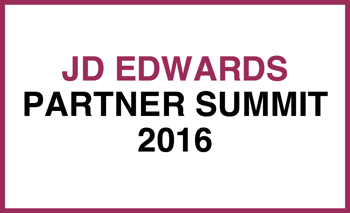JD Edwards Partner Summit 2016
 Another annual JD Edwards Partner Summit has come and gone, but for JD Edwards experts and business users, the fun is just beginning. Briteskies Managing Director Bill Onion and JD Edwards Delivery Director Dave Balser attended the Partner Summit again this year, and they are sharing the new JD Edwards concepts and functionality below:
Another annual JD Edwards Partner Summit has come and gone, but for JD Edwards experts and business users, the fun is just beginning. Briteskies Managing Director Bill Onion and JD Edwards Delivery Director Dave Balser attended the Partner Summit again this year, and they are sharing the new JD Edwards concepts and functionality below:
New Concepts
One concept that was discussed frequently during this year’s Summit was the theme of Alert, Analyze, and Act. Primarily seen in association with the internet of things and JD Edwards Orchestrator, this theme is helping to make EnterpriseOne a more reactive and proactive technology.
For example, a company that operates mining equipment might have sensors on those pieces of equipment that monitor temperature. Using Orchestrator, business users can program the mining equipment to automatically trigger a work and repair order in JD Edwards if the sensor monitors a temperature over a certain temperature. Via algorithms between both the sensor and JD Edwards, a technician is notified by an automated system and can come address the piece of equipment as needed.
Orchestrator allows a business analyst to set up those commands as opposed to having a developer create those algorithms for them, giving the business analyst more power over their JD Edwards EnterpriseOne implementation, and freeing up the developers’ time for other tasks.
Another new concept introduced at this year’s Summit was the Citizen Developer. As a way to open up the software and empower JD Edwards partners to create business solutions, JD Edwards is encouraging users to make a difference and create solutions to their unique business issues.
With these new developments, it is obvious that JD Edwards is looking to give JD Edwards users more power over their EnterpriseOne implementation.
New Functionality Announced
Some new functionality for EnterpriseOne was also announced at the Summit, including two big modules on the financial side of JDE.
One View Financial Statements
The first of these is One View financial statements, which is essentially EnterprieseOne’s answer to World’s FASTRs. One View financial statements is a great example of JDE’s desire to move more accessibility to the business user as opposed to the developers. Whereas previously a developer was needed to write a financial statement in EnterpriseOne, the financial users can now create their own reports.
Revenue Recognition
Additionally, the International Accounting Standards Board and Financial Accounting Standards Board have set up new accounting rules that will take effect in 2018. These revenue recognition standards will require revenue to be recognized when the performance obligations are complete, as opposed to when the invoice is sent. With the new functionality, JD Edwards can be configured to record the performance obligation liability at the time of invoicing and subsequently record the recognition of revenue upon completion of the performance obligation.
Outbound Inventory Management
Another new functionality announced for EnterpriseOne is outbound inventory management for both consignment and Vendor Managed Inventory. With outbound inventory management, the seller is responsible for monitoring stock levels and restocking when levels fall below certain minimums. This simplifies the process of managing off site inventory. This new functionality addresses concepts that JD Edwards had not addressed before, and outbound inventory management should eliminate the need for customizations or manual processes.
OATS Script Builder for JDE
The Oracle Application Testing Suite, or OATS, is an Oracle toolset that is now available to JD Edwards. The OATS Script Builder will be very impactful when it comes to saving time during testing, as it allows for automated testing of JD Edwards processes.
EnterpriseOne Page Composer
The new EnterpriseOne Page Composer is another example of JD Edwards making functionality more accessible for the business user as opposed to the technical user. Page Composer allows business analysts and other users to design and publish EnterpriseOne Pages without creating a cryptic text file. Instead, the pages are created by placing icons on a graphical design page and using drop downs to specify the program version to execute. The pages are designed and published from within a browser, not a traditional fat client typically used for development – another huge plus.

